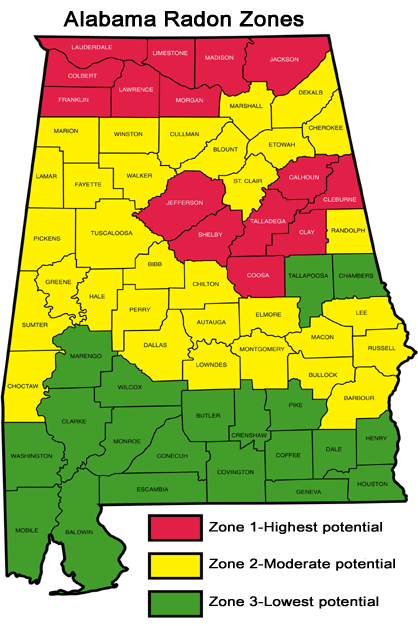General Radon Information:
Radon is a carcinogenic gas that is hazardous to inhale. Build-up of radon in homes is a health concern and many lung cancer cases are attributed to radon exposure each year. Each year, about 12% of lung cancer cases and more than 20,000 Americans die of radon-related lung causes. The Surgeon General of the United States has issued a Health Advisory warning Americans about the health risk from exposure to radon in indoor air. The Surgeon General urged Americans to test their homes to find out how much radon they might be breathing. He also stressed the need to remedy the problem as soon as possible. You cannot see, smell or taste radon, but, it still may be a problem in your home. When you breathe air containing radon, you increase your risk of getting lung cancer. In fact, the Surgeon General has warned that radon is the second leading cause of lung cancer in the United States today. If you smoke and your home has high radon levels, your risk of lung cancer is especially high.
Testing is the only way to find out your home’s radon levels:
EPA and the Surgeon General recommend testing all homes below the third floor for radon. Radon has been found in homes all over the United States. It comes from the natural breakdown of uranium in soil, rock and water and gets into the air you breathe. Radon typically moves up through the ground to the air above and into your home through cracks and other holes in the foundation. Your home can trap radon inside. Radon can also enter your home through well-water. If you find that you have high radon levels, there are ways to fix a radon problem. Even very high levels can be reduced to acceptable levels. Any home can have a radon problem. This means new and old homes, well-sealed and drafty homes, and homes with or without basements. In fact, you and your family are most likely to get your greatest radiation exposure at home. That is where you spend most of your time. Nearly 1 out of every 15 homes in the United States is estimated to have an elevated radon level. Elevated levels of radon gas have been found in north Alabama. If you hire a home inspector and want a radon test performed, choose an IAC2 certified air-quality professional.
Radon testing in: Huntsville, Madison, Toney, Athens, Ardmore, Elkmont, Lester, Mooresville, Belle Mina, Capshaw, Coxey, Greenbrier, New Hope, Harvest, Hazel Green, Meridianville, Moores Mill, New Market, Redstone Arsenal, Gurley, Owens Cross Roads, Triana, Brownsboro, Chase, Hobbs Island, Maysville, Big Cove, Monrovia, Moontown, Plevna, Ryland, Holland Gin, Oakland, Tanner, and Thach Alabama!

